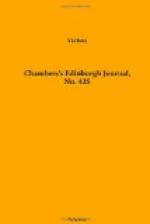Such was the position of affairs in Afghanistan when the government of India, in 1838, was roused to a sense of what seemed immediate danger by the movements in Central Asia. On the one hand, there was a de facto king, who had reigned twelve years, who was now struggling in the grasp of the ruler of the Punjab, and eagerly soliciting the alliance of the British; while the Russians and Persians, leagued before Herat, were already negotiating for a footing in his country. On the other hand, there was a deposed exile, who had tried repeatedly, and in vain, to recover his throne, whose whole life had been a tissue of misfortunes and feeblenesses, and who now lived on the charity of the Company in their own territory. The obvious policy was to secure the independence of Afghanistan and aid her resources. How to do this? To embrace the proffered alliance of Dost Mahomed, or force Shah Soojah upon the country, and prepare for the reception of the Persians and Russians, by kindling a civil war? The latter was the course determined on! A league was formed, known in the history of our time as the Tripartite Treaty—including Runjeet Singh, Shah Soojah, and the British government. By this document, it was agreed that certain large portions of the Afghan territory, including Peshawur, should belong for ever to Runjeet Singh; that the maharajah should likewise possess the passes both of the Sutlej and the Indus, with power to bar the way at his pleasure; that the Afghans and Sikhs should mutually exchange military assistance when required; and that the friends and enemies of any of the three high contracting parties should be the friends and enemies of all.




